
I had high hopes approaching the newly released London College of Music Examinations (LCME) Grades 6 to 8 handbooks – concert ukulele in hand. With contributions from the inimitable Colin R. Tribe, along with both improvisations and audio recordings performed by Matthew Quilliam, it looked set to be a welcome addition to the current higher-grade offers. Quilliam was the first person to use the ukulele for an entire music degree, graduating in 2023 with first class honours.
Before getting stuck into the nuts and bolts of the handbooks, which are currently available as digital PDFs only, it’s worth considering where the LCME syllabus sits in relation to what is already available. Figure 1 (below) shows an overview of the exam components of the three main exam boards offering ukulele at Grades 6 to 8.
 Figure 1. Components of ukulele Grades 6–8 for Rockschool, MTB Exams and LCME
Figure 1. Components of ukulele Grades 6–8 for Rockschool, MTB Exams and LCME
As you can see in the table, two of the LCME performance pieces must be selected from the graded list, rather than just one in the other boards. LCME also places greater weight on the musicianship tasks, which are more comprehensive and prescribed than the other two boards. The musicianship section includes a discussion on ‘knowledge’ of the ukulele, assessing a candidate’s knowledge of notes and location of parts of the instrument as well as the ukulele’s history and most notable players. More general musicianship tasks include clapping a rhythm, identifying a time-signature, identifying chords, clapping and playing a melody, and using melodies from three scales given.
I spent a happy afternoon playing through the 15 pieces across the three handbooks (five pieces in each). Although there is a slight lean towards jazz and blues overall, there is variety both stylistically and technically to satisfy the advanced instrumentalist. There were moments of absolute bliss achieving artificial harmonics, and deep concentration when applying an advanced level of finger dexterity required in several pieces. While each piece contained in the grades can hold its own, here are some of the highlights:
Grade 6 kicks off with ‘Mae’s March’, a tearaway of a ragtime ditty by Phil Doleman – one of the ukulele world’s treasures. Doleman’s pieces almost always feel like coming home; your fingers know where they need to go but there are enough surprises in there to trip you up if you get overconfident. Playing Stuart Whatmore’s arrangement of ‘Arkansas Traveller’, you’d be forgiven for thinking it’s a straightforward technical task until you reach the rubato section, which is an exercise in artificial harmonics.
Grade 7 includes the ray of sunshine that is ‘Pineapple Mango’, by composer Daniel Ho, as heard on the 2003 album Legends of the Ukulele. As sweet as it sounds, the level of technical challenge posed is substantial, including hammer-ons, arpeggiated chords, grace-notes, dynamic shifts and slides as well as a significant amount of movement around the instrument.
When I skimmed the repertoire for the Grade 8 handbook, I noticed Samantha Muir’s arrangement of J.S. Bach’s Prelude in C, wondering whether it might achieve at least some of the meditative warmth of the original. It quickly became one of my favourite arrangements – a stunning mix of campanellas, arpeggios and scale patterns offering a chance to experiment with gentle vibrato, allowing the ukulele to sing.
What strikes me most about the handbooks is that LCME presents a comprehensive approach that tests the whole musician. It is not possible to prepare for these grades simply by learning the pieces and winging it through a few scales. The introductory notes read: ‘The series provides a solid foundation of musical education for any ukulele student, whether intending to take an exam or not.’ I fully concur.
lcme.uwl.ac.uk/our-exams/guitar-ukulele/ukulele








